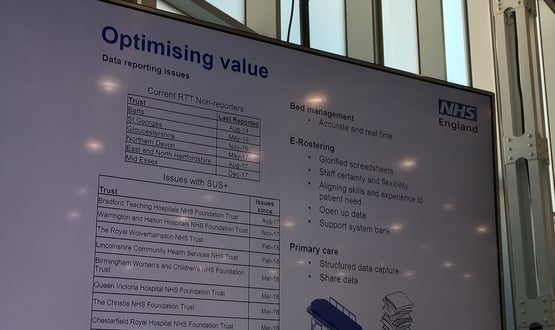‘Inadequate’ St George’s stops RTT reporting
- 1 November 2016

St George’s University Hospitals NHS Foundation Trust has joined the list of providers not reporting referral to treatment time data to NHS Digital.
A report by the Care Quality Commission, which rated the trust ‘inadequate’ overall and recommended that it should be put into special measures, says the trust stopped reporting RTT data in July. This brings the total number of trusts not submitting mandatory RTT returns to nine.
The CQC report says the trust commissioned an external review of its RTT data that reported in July. The trust then stopped national reporting of its RTT data, because it “could not guarantee that the data was robust and accurate.”
The CQC says the external review also found that a high number of unknown start times meant patients “were not being treated in chronological order”. Some experienced delays in getting a first appointment, and the trust was “inconsistent” in meeting the two-week target for patients with suspected cancer.
Despite this, the CQC’s latest inspection report suggests that the bulk of St George’s problems lie elsewhere. The trust was last inspected as recently as February 2014, when it was rated ‘good’.
The new report says “the most recent inadequate rating reflects a marked deterioration in the safety and quality of some trust services, as well as its overall governance and leadership.”
Many of the safety and quality issues are related to the poor state of the trust’s buildings. The CQC report says its Emergency Department is too small and overcrowded, as well as “extremely hot and uncomfortable.”
It says “a number of theatres were not fit for purpose” and that 16 out of 31 required “complete refurbishment.” The trust has poor fire detection systems although, ironically, parts of the estate “were in a state of disrepair” with water coming in after heavy rain.
The trust uses Cerner Millennium for its acute services and RiO for its community services. It has a good record on extending its use of Millennium. However, the CQC’s inspectors reported that “information technology issues impacted on staff’s timely access to information and, as a result, records were fragmented in some areas.”
Digital Health News reported in October that the trust had suffered a ‘freeze’ in its IT systems in June, which exposed a raft of technology problems, including out of support operating systems and ageing computers.
The trust board was told that an IT strategy would be needed to stabilise the IT system and deliver improvements, and that it was looking for a “strategic business partner” to develop such a strategy.
The CQC’s latest report criticises a lack of ‘strategic direction from the top of the organisation’, and says its inspectors found a “reactive rather than proactive approach to risk and environmental safety.”
Despite this, it said that staff “delivered care in a kind and professional manner” and managed to find some areas in which to innovate, such as using social media to communicate with patients.
St George’s lies within the South West London sustainability and transformation plan footprint. This is one of three to have broken with NHS England’s preferred timescale and to have published its STP.
As Digital Health News reported last week, the STP aims to remove a significant number of bed days to head off a financial crisis, by cutting the number of hospitals from five to four (or possibly three), and investing in integrated and digital patient services.
St George’s is slated to be retained in the STP plans; but the STP acknowledges its buildings are “increasingly unfit for purpose” and will require significant capital investment. Another local hospital, St Helier, has the highest critical infrastructure backlog of any in the country.
The nine trusts now failing to submit mandatory RTT returns are: Barking, Havering and Redbridge University Hospitals, Barts Health, Burton Hospitals, Great Ormond Street Hospital, Kettering General Hospital, Medway, Walsall Healthcare and Wye Valley.
Digital Health Intelligence maintains a database of the administrative and clinical systems in use at trusts, and uses this to calculate a clinical digital maturity index score for them. St George's (log-in required) has a score of 83 (out of 95) and is ranked 31 (out of 153).




